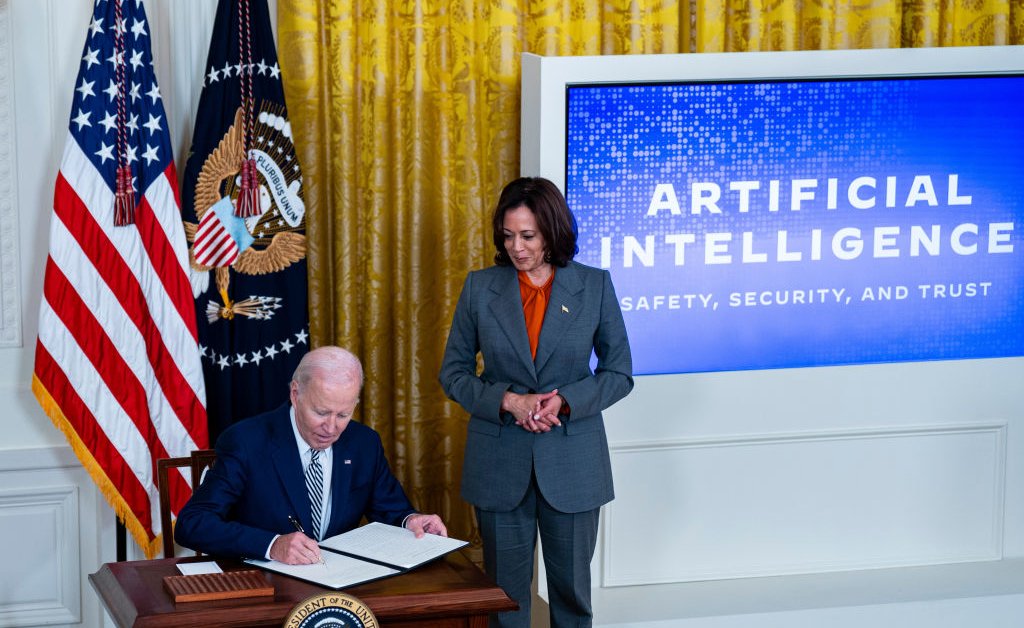The Republican Party adopted a new platform on June 8 ahead of a possible second term for former President Donald Trump. Buried among the party’s latest policy positions on abortion, immigration, and crime, the document contains a provision that worries some artificial intelligence experts: it vows to repeal President Joe Biden’s executive orders on AI.
“We will repeal Joe Biden’s dangerous executive orders that stifle innovation in AI and impose a radical left wing ideology on the development of this technology,” the platform states.
President Biden’s executive order on AI, signed last October, aims to address threats posed by new technologies to civil rights, privacy and national security, while promoting innovation and competition and encouraging the use of AI in public services. The order requires developers of the most powerful AI systems to share the results of safety tests with the U.S. government and asks federal agencies to develop guidelines for the responsible use of AI in areas such as criminal justice and federal benefit programs.
Read more: Why Biden’s AI executive order will only go so far
Carl Szabo, vice president of NetChoice, an industry group whose members include Google, Meta and Amazon, welcomed the possibility of the order being repealed, saying it was “good for Americans and good for innovators.”
“Rather than enforcing existing rules applicable to AI technology, President Biden’s executive order will simply impose new, complex bureaucratic burdens on small businesses and innovators looking to enter the market. Such excessive regulation undermines the incredible potential of AI advances and risks ceding America’s technological advantage to competitors like China,” Szabo said in a statement.
But Americans across the political spectrum are skeptical that the U.S. should avoid regulating AI in order to beat China, according to a recent poll obtained exclusively by TIME magazine. According to a late June poll by the AI Policy Institute (AIPI), 75% of Democrats and 75% of Republicans believe that “taking a carefully managed approach” to AI is preferable to “pushing ahead with AI as fast as possible in order to be the first country to get extremely powerful AI.”
“AI safety and the risks to national security are bipartisan issues, and polls have shown time and time again that Democrats and Republicans want AI safety legislation,” said Dan Hendricks, director of the Center for Secure AI.
Read more: Poll shows US voters prioritize safe AI development over competition with China
The proposal to remove the guardrails put in place by Biden’s executive order runs counter to broad public support for a cautious approach to AI, raising concerns among experts. Amba Kak, co-executive director of the AI Now Institute and former senior AI adviser at the Federal Trade Commission, said Biden’s executive order was “one of the greatest achievements in AI policy in the last decade” and that rescinding it would be “like going back to zero.” Kak said Trump’s promise to support AI development rooted in “human flourishing” is a subtle but harmful departure from more established frameworks such as human and civil rights.
“I think Trump’s message on AI is, ‘You’ve got to do it yourself,'” said Ami Fields Meyer, a former White House senior policy adviser on AI who worked on Biden’s executive order, noting that repealing the order would eliminate provisions aimed at protecting people from bias and unfair decision-making by AI.
TechNet, as well as many think tanks and tech lobbyists, have slammed the executive order since it was introduced for its potential to stifle innovation. In December, venture capitalist and prominent AI investor Ben Horowitz criticized efforts to regulate “math, FLOPs and R&D,” referring to the computing thresholds set in Biden’s executive order. Horowitz said his firm will “support like-minded candidates and oppose those who seek to kill America’s advanced tech future.”
Trump has previously accused tech companies like Google, Amazon and Twitter of working against him, and in June he said on Logan Paul’s podcast that California “tech companies” had donated $12 million to his campaign. “They gave me a lot of money. They weren’t interested in that,” Trump said.
The Trump campaign did not respond to a request for comment.
Even if Trump is re-elected and Biden’s executive order is revoked, some changes may not be immediately noticeable. Most major AI companies agreed to voluntarily share safety test information with the government at the International AI Summit held in Seoul last May, so removing the information sharing requirements of the executive order would not have an immediate impact on national security. However, Fields-Meyer said, “If the Trump campaign believes that the strict national security measures proposed in the executive order are radical liberal ideas, that should be of concern to all Americans.”
Fields-Meyer said the debate over the executive order underscores the importance of passing federal AI legislation, which “will provide more stability to AI policy.” There are currently more than 80 AI bills in Congress, but it seems unlikely that any of them will become law anytime soon.
Sandra Wachter, a professor of technology regulation at the Oxford Internet Institute, said Biden’s executive order is “a landmark step toward ensuring ethical AI, and it’s very similar to what’s happening in the UK, EU, Canada, South Korea, Japan, Singapore and other parts of the world.” Wachter worries that the order will be repealed before it can have a lasting impact. “It would be a huge loss and a huge missed opportunity if this framework were to be repealed and AI governance were to be reduced to a partisan issue,” Wachter said. “This is not a political issue, this is a human issue, and it’s a global issue.”



